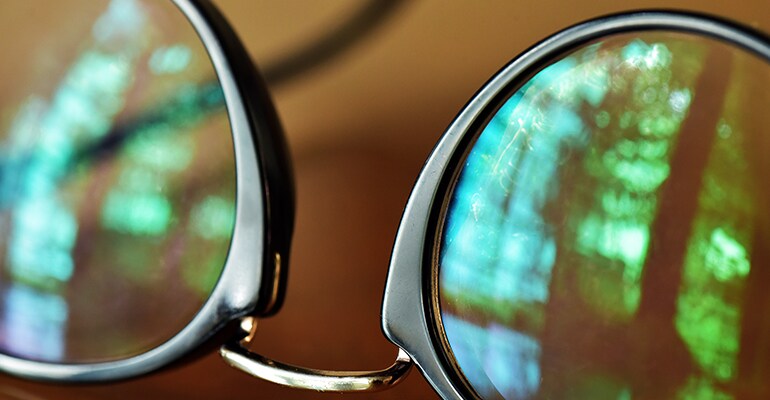A General Guide For Different Eyeglasses Coatings
Aug 25, 2023
You want your glasses to give you the best vision possible. By adding different types of coatings can optimize your vision. Here are some different coatings are available for eyeglasses.
Anti-reflective coating (also known as AR coating): This coating reduces glare and reflections on the lenses, making your vision clearer and improving the overall appearance of your glasses. It is especially useful for nighttime driving and computer use.
Scratch-resistant coating: This coating helps protect the lenses from scratches, keeping them in good condition for longer. While it doesn't make the lenses completely scratch-proof, it does provide added durability.
UV protection coating: This coating blocks harmful ultraviolet (UV) rays from the sun, which can cause damage to the eyes and skin. It is important to protect your eyes from UV radiation, even on cloudy days.
Blue light blocking coating: With increased screen time and exposure to digital devices, blue light blocking coatings have become popular. They help reduce the amount of blue light emitted by digital screens, reducing eye strain and promoting better sleep.
Water-repellent coating: This coating makes the lenses water-resistant, preventing water droplets from sticking to the surface. It also helps to repel dirt, dust, and oils, making the lenses easier to clean.
Anti-fog coating: This coating minimizes fogging on the lenses, allowing you to see clearly even in humid or cold conditions. It is particularly useful for those who wear glasses while exercising or in environments where temperature changes are frequent.

How Does Anti-Reflective Coating Work?
Anti-reflective coatings work by reducing the amount of light reflected off the surface of an object, such as eyeglasses or camera lenses. This is achieved by applying a thin coating of materials with a specific refractive index onto the surface, which helps cancel out the reflection of light waves. By minimizing reflection, the coating improves clarity, reduces glare, enhances contrast, and provides a more comfortable viewing experience.

How Does scratch-resistant coatings Work?
Scratch-resistant coatings work by forming a thin protective layer on a surface, typically made of polymers or ceramics, that enhances its hardness and durability. These coatings are designed to withstand abrasions from everyday use, preventing scratches and maintaining the appearance of the object. The protective layer acts as a barrier, absorbing the impact and distributing the force to minimize potential damage, ensuring that the surface remains scratch-free for an extended period of time.
How Does UV coatings Work?
UV protection coatings work by absorbing or reflecting ultraviolet (UV) radiation from the sun. These coatings typically contain special compounds or additives that are designed to interact with UV rays, preventing them from penetrating through to the underlying surface. This helps to protect objects or materials from the damaging effects of UV radiation, such as fading, discoloration, or deterioration. UV protection coatings are commonly used on various products, including sunglasses, car windows, paints, and plastics, to provide enhanced sun protection.
How Does Blue light blocking coatings Work?
Blue light coating works by applying a special coating to optical surfaces, such as eyeglasses or screens, which helps reduce the amount of blue light that is transmitted through the lens. This coating helps to protect our eyes from the harmful effects of blue light, such as eye strain, disrupted sleep patterns, and potential long-term damage to our vision.
Tips to clean your eyeglasses without damage the coatings:
It is important to be careful when cleaning eyeglasses with coatings to prevent any damage or scratches. Some common coatings on eyeglasses include anti-reflective coatings, scratch-resistant coatings, and hydrophobic coatings. To protect these coatings while cleaning, follow these tips:
Use a gentle cleaning solution: Avoid using harsh chemicals or cleaners that can strip away or damage the coatings. Use a mild dish soap or specially formulated eyeglass cleaner.
Use a microfiber cloth: Avoid using paper towels, tissues, or rough materials that can scratch the lens or coatings. Instead, use a clean, soft microfiber cloth to gently wipe the lenses.
Rinse before cleaning: Rinse the glasses with water before cleaning to remove any dust or debris that can cause scratches.
Avoid excessive pressure: Apply gentle pressure while wiping the lenses, avoiding any force that could potentially damage the coatings.
Store properly: When you are not wearing your glasses, store them in a protective case to prevent any accidental damage to the coatings.
By following these precautions, you can ensure the longevity and effectiveness of the coatings on your eyeglasses.
